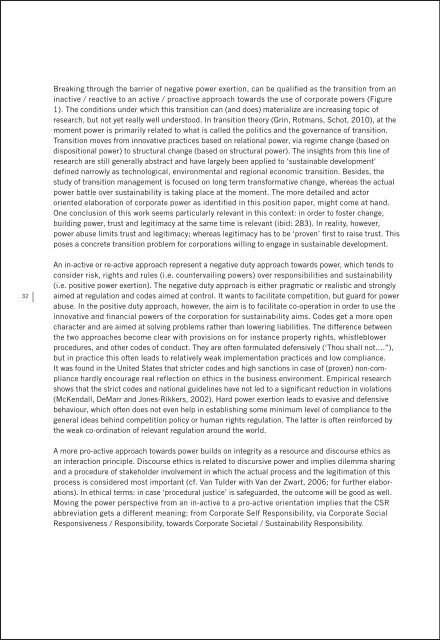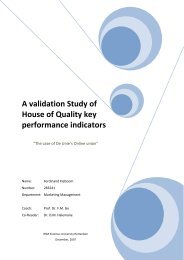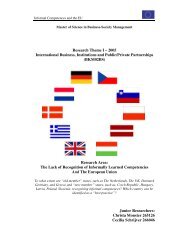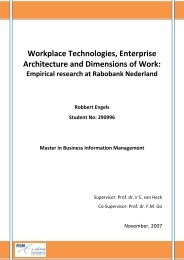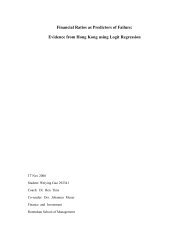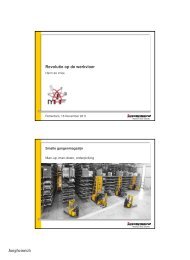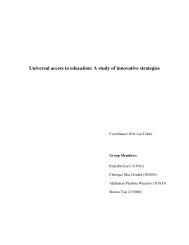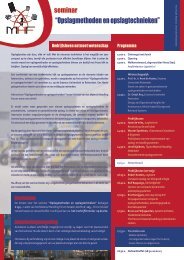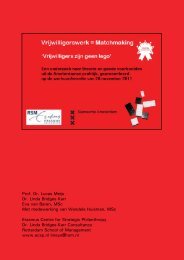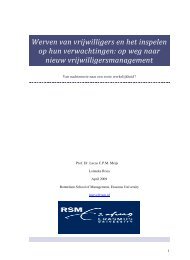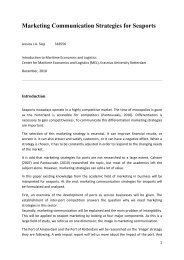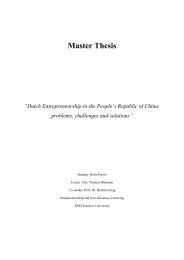Download With great power comes great responsibility (pdf) - ERIM
Download With great power comes great responsibility (pdf) - ERIM
Download With great power comes great responsibility (pdf) - ERIM
Create successful ePaper yourself
Turn your PDF publications into a flip-book with our unique Google optimized e-Paper software.
32<br />
Breaking through the barrier of negative <strong>power</strong> exertion, can be qualified as the transition from an<br />
inactive / reactive to an active / proactive approach towards the use of corporate <strong>power</strong>s (Figure<br />
1). The conditions under which this transition can (and does) materialize are increasing topic of<br />
research, but not yet really well understood. In transition theory (Grin, Rotmans, Schot, 2010), at the<br />
moment <strong>power</strong> is primarily related to what is called the politics and the governance of transition.<br />
Transition moves from innovative practices based on relational <strong>power</strong>, via regime change (based on<br />
dispositional <strong>power</strong>) to structural change (based on structural <strong>power</strong>). The insights from this line of<br />
research are still generally abstract and have largely been applied to ‘sustainable development’<br />
defined narrowly as technological, environmental and regional economic transition. Besides, the<br />
study of transition management is focused on long term transformative change, whereas the actual<br />
<strong>power</strong> battle over sustainability is taking place at the moment. The more detailed and actor<br />
oriented elaboration of corporate <strong>power</strong> as identified in this position paper, might come at hand.<br />
One conclusion of this work seems particularly relevant in this context: in order to foster change,<br />
building <strong>power</strong>, trust and legitimacy at the same time is relevant (ibid: 283). In reality, however,<br />
<strong>power</strong> abuse limits trust and legitimacy; whereas legitimacy has to be ‘proven’ first to raise trust. This<br />
poses a concrete transition problem for corporations willing to engage in sustainable development.<br />
An in-active or re-active approach represent a negative duty approach towards <strong>power</strong>, which tends to<br />
consider risk, rights and rules (i.e. countervailing <strong>power</strong>s) over responsibilities and sustainability<br />
(i.e. positive <strong>power</strong> exertion). The negative duty approach is either pragmatic or realistic and strongly<br />
aimed at regulation and codes aimed at control. It wants to facilitate competition, but guard for <strong>power</strong><br />
abuse. In the positive duty approach, however, the aim is to facilitate co-operation in order to use the<br />
innovative and financial <strong>power</strong>s of the corporation for sustainability aims. Codes get a more open<br />
character and are aimed at solving problems rather than lowering liabilities. The difference between<br />
the two approaches become clear with provisions on for instance property rights, whistleblower<br />
procedures, and other codes of conduct. They are often formulated defensively (‘Thou shall not….”),<br />
but in practice this often leads to relatively weak implementation practices and low compliance.<br />
It was found in the United States that stricter codes and high sanctions in case of (proven) non-com -<br />
pliance hardly encourage real reflection on ethics in the business environment. Empirical research<br />
shows that the strict codes and national guidelines have not led to a significant reduction in violations<br />
(McKendall, DeMarr and Jones-Rikkers, 2002). Hard <strong>power</strong> exertion leads to evasive and defensive<br />
behaviour, which often does not even help in establishing some minimum level of compliance to the<br />
general ideas behind competition policy or human rights regulation. The latter is often reinforced by<br />
the weak co-ordination of relevant regulation around the world.<br />
A more pro-active approach towards <strong>power</strong> builds on integrity as a resource and discourse ethics as<br />
an interaction principle. Discourse ethics is related to discursive <strong>power</strong> and implies dilemma sharing<br />
and a procedure of stakeholder involvement in which the actual process and the legitimation of this<br />
process is considered most important (cf. Van Tulder with Van der Zwart, 2006; for further elabor -<br />
ations). In ethical terms: in case ‘procedural justice’ is safeguarded, the outcome will be good as well.<br />
Moving the <strong>power</strong> perspective from an in-active to a pro-active orientation implies that the CSR<br />
abbreviation gets a different meaning: from Corporate Self Responsibility, via Corporate Social<br />
Responsiveness / Responsibility, towards Corporate Societal / Sustainability Responsibility.<br />
3.2 Limiting <strong>power</strong> abuse: a negative duty approach towards <strong>power</strong> and sustainability<br />
The negative duty approach is easiest to apply for the abuse of a company’s positioning <strong>power</strong>.<br />
Companies have started to openly report on collusion or on the bribes they pay. The Global Reporting<br />
Initiative (GRI) provides thereby an increasingly ambitious benchmark for reporting. From a relatively<br />
inactive approach of reporting in its G1 version in early 2000, GRI has moved into the formulation<br />
of more active indicators (G3) of sustainability. G3 includes coverage for expenditures on fines for<br />
noncompliance with laws and regulation, corruption and lobbying expenditures. In particular the S07<br />
category provides the basis self-reporting effort of companies on anticompetitive behavior. Checking<br />
for this category therefore provides some modest – minimum – performance measure as regards anticollusion<br />
measures of companies. Combined with the level of external compliance (as covered by C<br />
(lowest) and A+ (highest) scores), the S07 scores give an indication of the way corporations handle<br />
their position <strong>power</strong>. At the highest level of transparency, the score can be considered ‘active’, unless<br />
companies provide more detailed information on how they share <strong>power</strong> and position.<br />
No general statistics are available yet on the reporting of companies on this indicator. We checked<br />
for the reporting scores for a representative group of frontrunner companies. Frontrunners can be<br />
expected to define the state-of-art in this particular area. The so called “Global super sector leaders”<br />
of the Dow Jones Sustainability Index (DJSI, 2010 / 2011) provides an appropriate sample for this<br />
exercise. The DSJI index scores companies on their relative performance in sustainability. The DJSI<br />
specifies the leading companies for 19 ‘super sectors’ (Table 2).<br />
No American companies are amongst the leaders. There is a <strong>power</strong> perspective to this finding. The<br />
American regime has been portrayed as an extreme case of a ‘negative duties’ approach, in which<br />
negative considerations for sustainability prevail due the legal context in which companies have to<br />
operate. This implies a risk and liabilities orientation of American companies that make it difficult to<br />
move into a more active position. Table 2 further illustrates that all leading companies apply the GRI<br />
reporting guidelines, but to varying degrees. At least 11 have an A level ambition, while 11 are also<br />
externally assured. On closer scrutiny we found 10 of these frontrunner companies to have included<br />
S07 scores in their reporting.<br />
A leading position in the DJSI does not necessarily relate to active strategies relating to <strong>power</strong> abuse.<br />
A number of the sector leaders report anti-trust cases against them in 2009. Examples are Nokia,<br />
AkzoNobel and Unilever. Anti-trust considerations do not play a prominent role in including or<br />
excluding firms from the DJSI. DANONE / Numico is an example of a more explicit approach towards<br />
collusion: in its annual report a ‘business conduct policy’ prohibits anti-competition measures by<br />
managers, followed by a competition memo explaining the practicalities of the competition rules that<br />
have to be followed. AkzoNobel formulated a ‘comprehensive competition law compliance<br />
programme’ next to its Code of Conduct. Both strategies can be interpreted as a re-active response to<br />
the investi gations and/or fines imposed upon these companies by the European Union for anticompetitive<br />
behavior. No major initiatives on strengthening (the operation of) anti-trust regulation<br />
have been taken by these leader companies. Aegon states that the company is committed to ‘fair<br />
competition’, while also stating that they want to build long-term relationships with customers,<br />
business partners and regulators. On the whole, the median score of leading companies in the DSJI<br />
as well as in the Netherlands on their dealings with <strong>power</strong> abuse can be considered as primarily<br />
reactive.<br />
33


